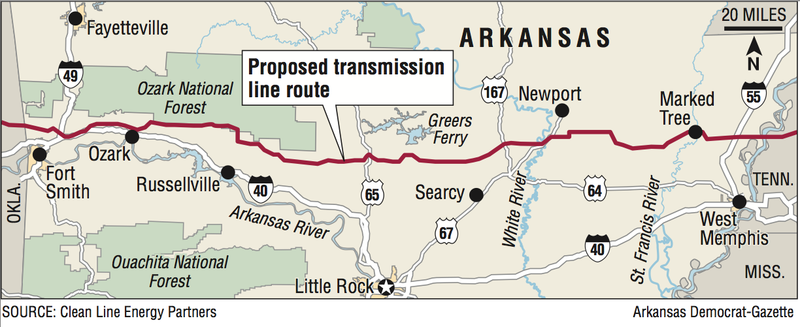A House subcommittee Wednesday heard arguments on a bill that would allow Arkansas officials to weigh in before the federal government could give eminent-domain authority to a company that wants to build a power line across the state.
Members of the Arkansas congressional delegation testified before the Water, Power and Oceans Subcommittee of the House Committee on Natural Resources on House Bill 3062. If passed, the bill also would require the federal government to put the route of the proposed Clean Line Energy Partners' power line on federal land rather than private property.
Proponents of HB3062 and its mirror bill in the Senate, SB485, said the changes would be minor and would restore states' rights in determining the siting of power lines in their states.
Texas attorney Bill Burchette, who represents four east Texas electric cooperatives, testified that passage of the bill would kill Clean Line's plan to deliver wind-generated power from Oklahoma to Tennessee, waste the time and millions of dollars the company has invested in the project, and discourage future investment in power-transmission projects.
Houston-based Clean Line has applied to the U.S. Department of Energy to partner with the federal government under Section 1222 of the Energy Policy Act of 2005.
If approved, Clean Line would acquire under eminent domain the easements and rights of way on which to build a 3,500-megawatt, direct-current electricity transmission line through 12 Arkansas counties. The company says the project would cost about $2 billion.
The Energy Department's decision on Clean Line's application is pending the release of a final environmental impact statement that could be issued "at any time," according to a subcommittee memorandum.
Clean Line said in an emailed statement Wednesday that the company is committed to conducting easement negotiations in a manner that is fair to the landowners and respectful of their privacy rights. The company estimates that it will spend more than $30 million for easements in Arkansas.
The statement added that Clean Line would use condemnation "as a very last resort after all reasonable attempts at voluntary easement acquisition have been exhausted."
Committee Chairman Rep. John Fleming, R-La., said at the outset of the hearing that the Department of Energy was invited to testify Wednesday, but it did not send a witness.
Little Rock attorney Jordan Wimpy, who represents several Arkansas opponents of the Clean Line project, testified that while 15 public hearings were held around the state to get input on the project, there were no public meetings on the potential effect of Clean Line being given eminent domain under Section 1222.
He said little is known about the factors the Energy Department is weighing in considering Clean Line's application. He said the department has not said, for example, whether there is demand for the wind power that Clean Line proposes to transmit. No purchasers have been identified for the power.
"This legislation is a culmination of concerns surrounding states' rights that are held at the will of a closed-door process with the claim of support for jobs and necessary infrastructure," U.S. Rep. Steve Womack, R-Ark., said in his statement before the subcommittee. Womack introduced HB3062.
U.S. Sen. John Boozman, R-Ark., also testified before the subcommittee.
He said the delegation sent a letter six weeks ago to Energy Secretary Ernest Moniz with questions about the department's review of the project. He said a staff member met with the delegation last week, but the department has yet to respond to the questions in the letter.
"The department should not use this unprecedented authority, particularly in the manner that lacks transparency, and should respond to our questions as quickly as possible," he said.
Burchette testified that passage of the bill would make projects to transmit power through multiple states impossible because it would take just one state opposed to the project to derail the entire project.
And, while there are no buyers for Clean Line wind power now, the demand is growing for wind and other renewable energy sources, Burchette said.
"The government says 'deliver more renewables,' and here's an opportunity to do it," he said.
In a statement to the subcommittee, Burchette said that changing the rules midstream in Clean Line's application process would send a signal to potential investors in future energy infrastructure.
He said members of Congress should be concerned "if such investors develop a concern that their very large investments can be undermined by volatile legislation activity at the eleventh-hour of a multiyear process."
In another development, U.S. Sen. Tom Cotton, R-Ark., wrote a letter to Moniz on Tuesday, questioning whether Clean Line is paying the salaries of the Energy Department employees handling the company's application for the Section 1222 private-government partnership and whether they have had "adequate conflicts of interest training."
Cotton said Clean Line representatives have estimated application costs totaling between $10,000 and $1 million a month, and that it was known that the company was paying for the application costs of the approval process.
"Section 1222 approval allows a private company to force citizens to sell land they do not wish to sell," Cotton wrote. "Regardless of the merits of the application, a process with consequences this serious should be conducted with integrity, transparency, and free from blatant conflicts of interest."
Metro on 10/29/2015
